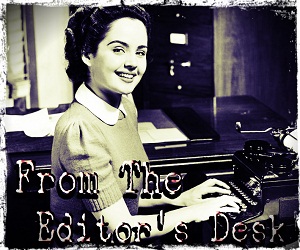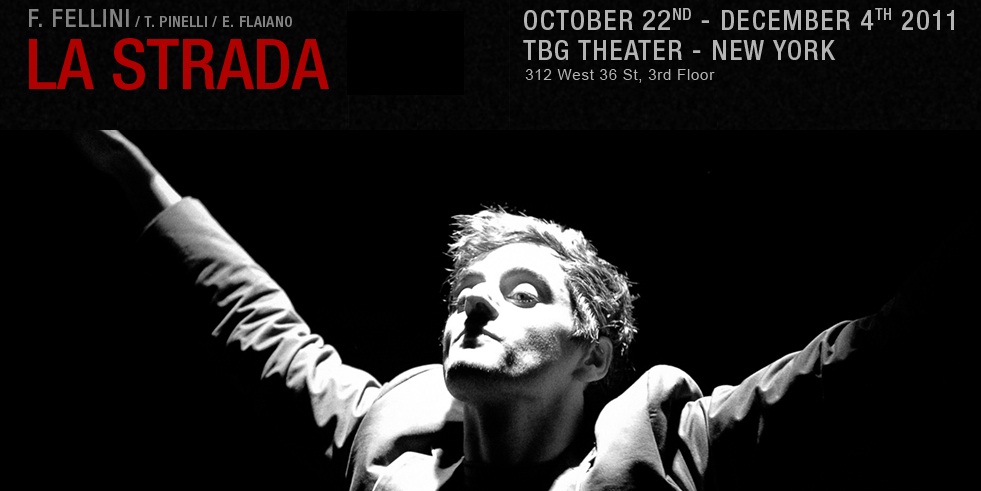The concept of adapting La Strada (the 1954 film by masterful auteur Federico Fellini) for the stage is a daring one. And not just daring, but ambitious as well. It’s not easy to take a pre-existing work and re-envision it — on the one hand you’ve got to make sure that you keep the familiar bones of the piece in tact, while at the same time you must recognize and realize the opportunity for innovation.
La Strada Company, a New York based Spanish company, has done a lot of things well in their adaption and – even more – directors Rene Buch and Jorge Merced conceived a lot of things brilliantly. Yet in their excitement to present a unique piece of theatre which deviates from the film they make a few pacing choices which make this interpretation feel like two separate shows rather than a cohesive whole. There is a difference between exploring a theme and giving it a predominant vein versus letting it completely take over and run away with the first part of your production. La Strada is masterful, brilliant, beautiful, stirring, touching and wonderful — but not until about a third into the show.
What this staged version offers – and the idea is intriguing – is a back story for the cruel side-show strong man, Zampano, (the wonderful Luis Carlos de La Lombana) and his exquisitely frail, naive waif of an assistant who endures his brutality, Gelsomina (a heartbreaking Nanda Abella). Rather than this odd pair being the sole thrust of the play they become a fabrication created by three clowns (“Hat”, “Scarf” and “Coat”) based on props each has found which later take center stage in the story: a pebble, a chain and a trumpet. The clowns are desperate to come up with a story using these props because if they don’t they have been told by their boss that they will be fired.
By giving a prequel to the recognizable story of La Strada the clowns make the whole guts of it even more of a metaphor than Fellini did, which is a fantastic idea in theory. What takes an enormous leap of faith is believing that this bumbling group of clowns who can’t seem to know what to do with a chain, a trumpet and a pebble only moments before suddenly have an idiot savant moment between the three of them and cohesively whip up the multi-layered, deeply intricate, terribly brutal, gut wrenching and sad story that then plays out so richly. If Roberto Benigni ever decided to re-make La Strada, there’s a solid chance it would look very similarly to this.
Once Hat (Winston Estevez), Scarf (Israel Ruiz) and Coat (Maria Peyramaure) decide what to do with the pebble, the chain and the trumpet then the story emerges and the brilliance of this group is finally allowed to be showcased. Backed by brooding black and white landscaping and a feeling of desolation the strongman and his flinching young assistant perform for the crowds. While the girl, Gelsomina, is obviously willing to do whatever is necessary to make Zampano happy he still insists on berating her, disparaging her and maligning her anyway. It seems to be his way, no matter how complicit the girl is, so he’s certainly not about to change now. For her part, Gelsomina takes it all with a subservient posture and a thankful candor for that, too, is her way.
While Zampano performs an act that involves wrapping himself with a chain and then breaking free, Gelsomina gamely bangs the drum and delights in the small but joyful response she receives from the crowd for her efforts. At night she is made to service Zampano in other ways, all the while being told she is not the same as her sister, Rosa, whom we come to find out she has replaced. It seems that Zampano bought her sister from her poor family and, one year later when her sister died, was offered Gelsomina as a replacement. While the situation isn’t ideal there doesn’t seem to be a better life awaiting the girl anywhere else.
When The Fool (Israel Ruiz) – a tightrope walker and clown who has taken a liking to Gelsomina – realizes he has also managed to provoke Zampano into a rage every time he comes around he clearly disregards the warning signs and continues to visit the girl. There’s a strangeness to The Fool’s way of speaking with Gelsomina – while he seems to like her he tells her she is really useless. He goes on to compare her to a pebble … after all, if the pebble has use, the girl must be good for something too — even though she is unattractive and has no skills. He dangles the prospect of possibly going with him in front of her (Would you really like to come with me?), then cruelly (though with a smile) take the hope away from her (But I don’t want a woman around. I don’t need it. … Good bye.)
This is devastating – two men … one who cruelly uses her and won’t let her go, one who is sweet to her but then tosses her away. To watch this scenario play out is heartbreaking, and the three principal actors are exquisite during these moments. There is a despair deep down in the bones of these people and the weight of it sits heavy in this theatre. The props are made all the more poignant by the idea of Hat, Coat and Scarf finding an inner journey for them which they translate as metaphor for these people’s story.
Casting a shadow over the entire play is the irony of making your living on the road: where every day is repeated – the same schtick, the same act, the same word-for-word gimmicks, and yet there is no hope of putting down roots because nothing is allowed to be constant. Repetition without consistency. Even Gelsomina’s sad notion of one day being able to see the tomato plants flower from the seeds she has planted is cruelly brushed aside by Zampano who feels that two weeks in one place is an eternity. Ultimately, this girl will never be allowed to put down roots anywhere.
Original music composed by La Lombana and Caridad Martos (played on violin by Stephanie Davis and trumpet by Jennifer Harder) does a beautiful job of coaxing out emotions and underscoring parallels between different moments of the piece. The costumes by Kanako Hiyama are simple and mono-chromatic, echoing both the bleakness of the life of the characters as well as the original film. The show, it should be noted, is performed entirely in Spanish with English translation on a discreet monitor. While this may, in the beginning, cause a bit of split focus it soon becomes second nature – as with the titles of any foreign film – and merely becomes another visual cue.
There is no doubt that this production of La Strada is rich and thoughtful. It is definitely beautifully nuanced and deserves high praise. And as long as audiences are ready to be slowly brought into the piece by a very long introduction — which may, depending on your point of view, seem incongurous — this show is well worth it. Just understand there’s a healthy dose of comedy with the tragedy and what may seem off-putting more than makes up for it once the story is allowed to unfold.
~~~
Luis Carlos de La Lombana Presents La Strada Saturday, October 22, 2011 through Sunday, December 04, 2011 Please note:Show is closed the week of Monday Nov. 21st-Nov. 28th for Thanksgiving .The Barrow Group Theatre 312 West 36th Street 3rd Floor New York, NY 10018 (Between 8th and 9th Ave) . General Admission $25.00 Click here for tickets









{ 0 comments… add one now }